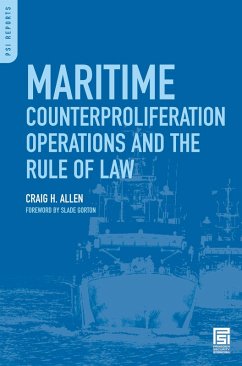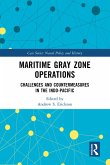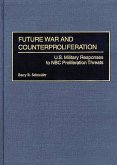Allen examines the maritime counterproliferation activities of nations participating in the Proliferation Security Initiative, as set out in their Statement of Interdiction Principles. He explains the framework for conducting maritime interception activities, examines the importance of intelligence to PSI operations, and assesses the legal issues raised by those operations.
The threat of WMD use by terrorist groups and rogue regimes has added new urgency to global security discussions. Responses to the dangers posed by WMD include the nonproliferation regime, safeguards for WMD materials while in transit, export controls, treaties on terrorism, Security Council resolutions, and the new Protocol to the Convention for the Suppression of Unlawful Acts Against the Safety of Maritime Navigation.
The existing nonproliferation regime will never, by itself, provide an adequate level of security. As a result, risk management strategies must include layered counterproliferation activities and consequence management. Counterproliferation measures may include maritime interdictions. The Proliferation Security Initiative, a cooperative undertaking launched in 2003, provides a framework for those interdictions. The framework was formalized in the Statement of Interdiction Principles.
After providing an overview of the threats posed by WMD proliferation, this book surveys the nonproliferation regime and counterproliferation measures states have adopted to supplement it. It next provides an overview of maritime interception operations and the intelligence issues surrounding them, before turning to the laws governing such operations. It then examines each of the actions described in the PSI Statement of Interdiction Principles to assess their compliance with applicable laws. Finally, it looks at the laws that establish the responsibility of states for taking unwarranted counterproliferation actions against vessels.
The threat of WMD use by terrorist groups and rogue regimes has added new urgency to global security discussions. Responses to the dangers posed by WMD include the nonproliferation regime, safeguards for WMD materials while in transit, export controls, treaties on terrorism, Security Council resolutions, and the new Protocol to the Convention for the Suppression of Unlawful Acts Against the Safety of Maritime Navigation.
The existing nonproliferation regime will never, by itself, provide an adequate level of security. As a result, risk management strategies must include layered counterproliferation activities and consequence management. Counterproliferation measures may include maritime interdictions. The Proliferation Security Initiative, a cooperative undertaking launched in 2003, provides a framework for those interdictions. The framework was formalized in the Statement of Interdiction Principles.
After providing an overview of the threats posed by WMD proliferation, this book surveys the nonproliferation regime and counterproliferation measures states have adopted to supplement it. It next provides an overview of maritime interception operations and the intelligence issues surrounding them, before turning to the laws governing such operations. It then examines each of the actions described in the PSI Statement of Interdiction Principles to assess their compliance with applicable laws. Finally, it looks at the laws that establish the responsibility of states for taking unwarranted counterproliferation actions against vessels.









